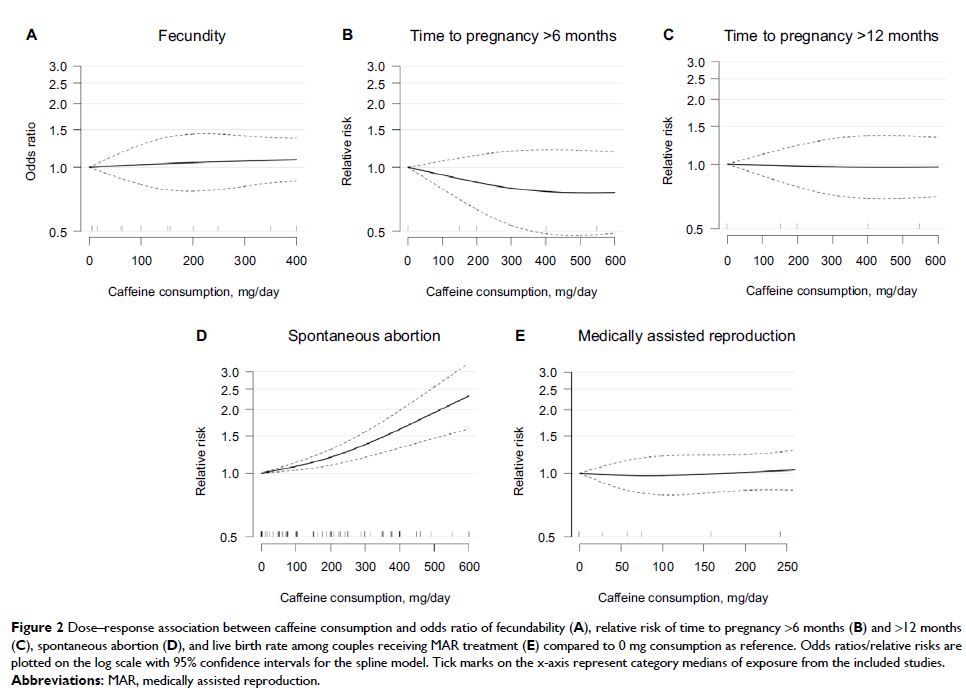108384
论文已发表
注册即可获取德孚的最新动态
IF 收录期刊
- 3.4 Breast Cancer (Dove Med Press)
- 3.2 Clin Epidemiol
- 2.6 Cancer Manag Res
- 2.9 Infect Drug Resist
- 3.7 Clin Interv Aging
- 5.1 Drug Des Dev Ther
- 3.1 Int J Chronic Obstr
- 6.6 Int J Nanomed
- 2.6 Int J Women's Health
- 2.9 Neuropsych Dis Treat
- 2.8 OncoTargets Ther
- 2.0 Patient Prefer Adher
- 2.2 Ther Clin Risk Manag
- 2.5 J Pain Res
- 3.0 Diabet Metab Synd Ob
- 3.2 Psychol Res Behav Ma
- 3.4 Nat Sci Sleep
- 1.8 Pharmgenomics Pers Med
- 2.0 Risk Manag Healthc Policy
- 4.1 J Inflamm Res
- 2.0 Int J Gen Med
- 3.4 J Hepatocell Carcinoma
- 3.0 J Asthma Allergy
- 2.2 Clin Cosmet Investig Dermatol
- 2.4 J Multidiscip Healthc

Association between coffee or caffeine consumption and fecundity and fertility: a systematic review and dose–response meta-analysis
Authors Lyngsø J, Ramlau-Hansen CH, Bay B, Ingerslev HJ, Hulman A, Kesmodel US
Received 17 July 2017
Accepted for publication 26 September 2017
Published 15 December 2017 Volume 2017:9 Pages 699—719
DOI https://doi.org/10.2147/CLEP.S146496
Checked for plagiarism Yes
Review by Single-blind
Peer reviewers approved by Dr Colin Mak
Peer reviewer comments 3
Editor who approved publication: Professor Henrik Toft Sørensen
Objective: The aim was to investigate whether coffee or caffeine consumption
is associated with reproductive endpoints among women with natural fertility
(ie, time to pregnancy [TTP] and spontaneous abortion [SAB]) and among women in
fertility treatment (ie, clinical pregnancy rate or live birth rate).
Design: This study was a systematic review and dose–response
meta-analysis including data from case–control and cohort studies.
Methods: An extensive literature search was conducted in
MEDLINE and Embase, with no time and language restrictions. Also, reference
lists were searched manually. Two independent reviewers assessed the manuscript
quality using the Newcastle–Ottawa Scale (NOS). A two-stage dose–response
meta-analysis was applied to assess a potential association between
coffee/caffeine consumption and the outcomes: TTP, SAB, clinical pregnancy, and
live birth. Heterogeneity between studies was assessed using Cochrane Q -test and I 2 statistics. Publication bias was assessed using Egger’s regression
test.
Results: The pooled results showed that coffee/caffeine
consumption is associated with a significantly increased risk of SAB for 300 mg
caffeine/day (relative risk [RR]: 1.37, 95% confidence interval [95% CI]: 1.19;
1.57) and for 600 mg caffeine/day (RR: 2.32, 95% CI: 1.62; 3.31). No
association was found between coffee/caffeine consumption and outcomes of
fertility treatment (based on two studies). No clear association was found
between exposure to coffee/caffeine and natural fertility as measured by
fecundability odds ratio (based on three studies) or waiting TTP (based on two
studies).
Conclusion: Results from this meta-analysis support the
growing evidence of an association between coffee/caffeine intake and the risk
of SAB. However, viewing the reproductive capacity in a broader perspective,
there seems to be little, if any, association between coffee/caffeine
consumption and fecundity. In general, results from this study are supportive
of a precautionary principle advised by health organizations such as European
Food Safety Authority (EFSA) and World Health Organization (WHO), although the
advised limit of a maximum of two to three cups of coffee/200–300 mg caffeine
per day may be too high.
Keywords: coffee,
caffeine, fecundity, fertility, spontaneous abortion, assisted reproduction
